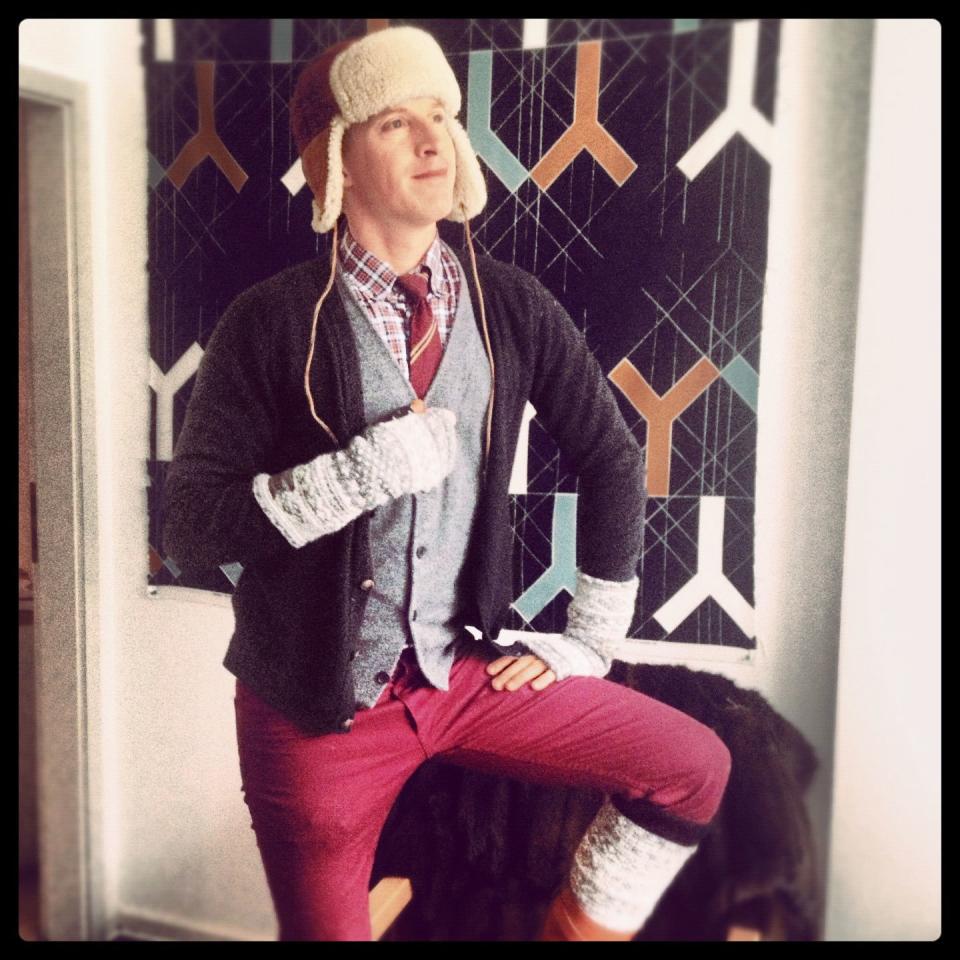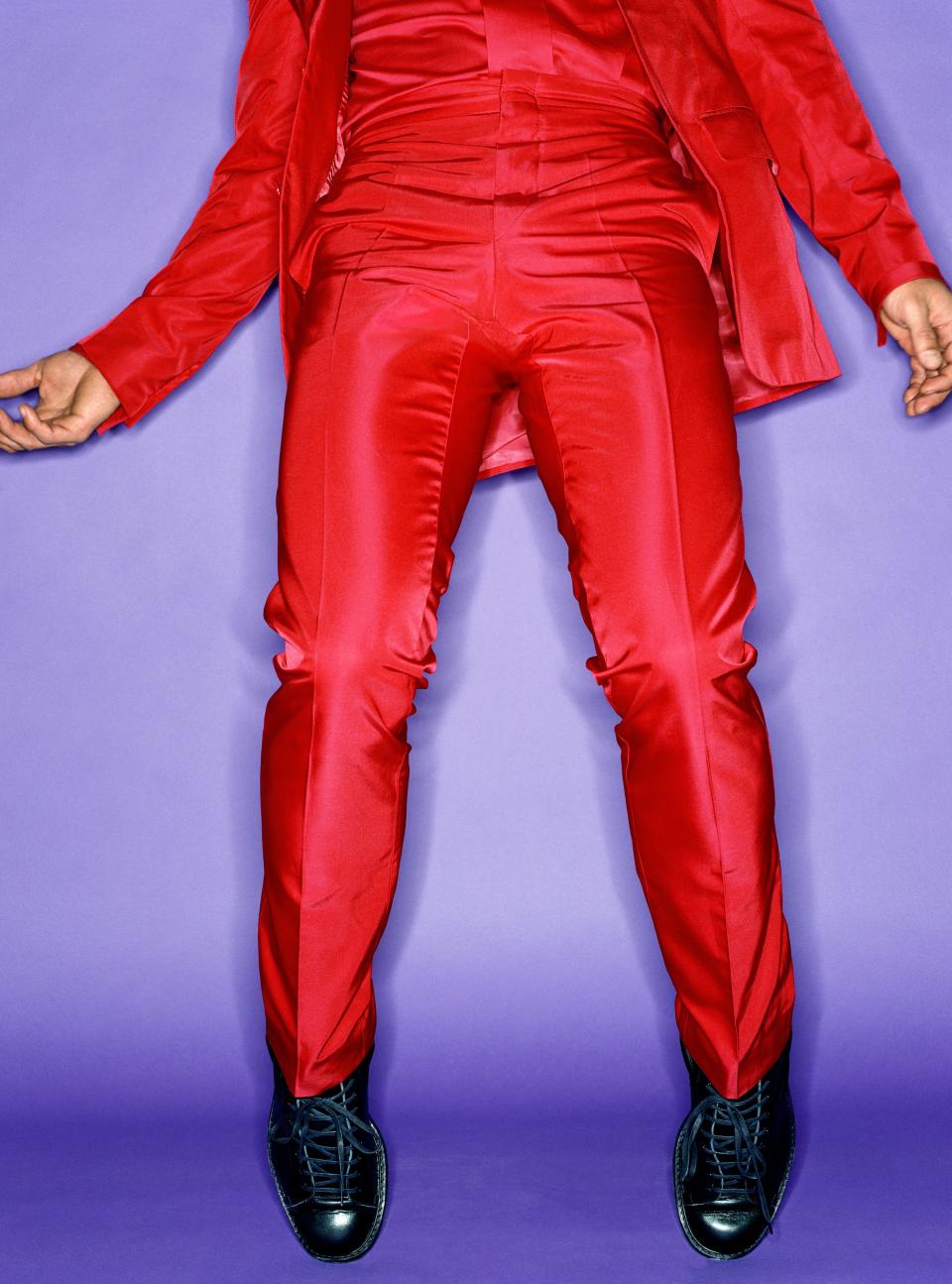More Is More: Novelist Andrew Sean Greer on the Virtues of Questionable Taste
It took me a long time to find my look. I have no real excuse for this, but here is me trying: I grew up in the wilderness of suburban Maryland, a state so bland that its official song sounds like a Christmas carol. I was raised by scientists, by which I don’t mean secret military operatives who could replace my bones with titanium; I mean my dad was a theoretical chemist and my mother an experimental chemist. Their view of the world was so restrained that once, when I asked my mother why the sky was blue, she replied, “Dear, that’s not my field.” I was the only Gentile kid in a Jewish neighborhood, and felt so left out that when I turned thirteen I insisted my parents throw me a “faux mitzvah” so I could have a party like all my friends. My point is: I was an awkward outsider in many ways. If style is how you tell your story to the world before it tells it for you, I had no idea what my story was; I didn’t even know I wasn’t Jewish. I didn’t even know I wasn’t straight.
I was a suffering teen whose gayness, unacknowledged even to himself, expressed itself through ill-advised (and quite ordinary) fashion choices: giant sweatshirts, acid-washed jeans, Beach Boys T-shirts. Style is supposed to come prepackaged with gayness, like a charger for your phone, but mine came without. Usually a gay boy can count on a mother or a mother figure to have a jewelry box of treasures to try on in secret moments, or a closet of high heels, but my own dear mother was no help. She turned out to be gay herself, and her jewelry box held only ERA medallions, her closet only flats. Mom and I marched together through suburban life in the uniform of blandness, trying not to be seen, back when the Gap sold Levi’s and Banana Republic sold safari shirts (it was not until years later that she and I came out to each other, on the very same night—a story for another time). When I attended college—this was during the George H.W. Bush years—I encountered a different set: foreigners, New Yorkers, boarding school kids. I had never seen a woman in a black leather skirt; I had never seen a man in a neck scarf. I recall making a friend from Puerto Rico, who, when I told him I was from suburban Maryland, nodded and said, “Now I understand your clothes.” Everyone seemed so worldly and sophisticated; why couldn’t I seem that way too? Another memory: A friend sent me out with the express command that I come back with a reasonably tasteful V-neck sweater. I returned with a red acrylic knit I found on discount; the expression on his face was one I will never forget. I would like to say I dressed like a penniless middle-class kid. I suppose another way to put it is I dressed like a virgin.

Later, much later, living on the West Coast, I faced a new challenge: How to express, through fashion, that I had become a fully realized, politically aware, sexually liberated queer adult? Gone were the virginal sweatshirts. And the street-sale V-necks. And the Tweeds catalog. In their place I chose an honored path many had taken before me—vulgarity—and I have never looked back.
“The vulgar,” psychoanalyst Adam Phillips once explained to artist and writer Leanne Shapton in The New York Times, “refuse to miss out.” That neatly describes me; every item in my closet has to be “special” in some way, and I don’t mean Marie Kondo “sparking joy” special, I mean like Transformers special: a jacket that’s also a sweater, pants that zip into shorts, a dress shirt with a removable collar, a raincoat that morphs into a bag, and other clothes caught in the act of metamorphosis. A wardrobe out of Ovid; a centaur’s closet. I am fully aware that the essence of elegance is simplicity, and that you must remove one bracelet before you leave the house for the day, and so on. I find myself in clothing stores holding a plain black sweater and telling myself, over and over, that this is what a grown man wears; I stand before the mirror and my rational mind says: This is an investment in maturity. But I just can’t do it.
My group of friends is surprisingly supportive. Or perhaps half-blind: My friend Tricia will pick up single boots at yard sales and wear them together; my friend Soo thinks nothing of a pink Indian dress with a Oaxacan skull necklace. I have, I’m not afraid to admit, Burning Man friends, for whom pom-poms are an appropriate male accessory. Let me add we are all around 50. “No, you’re not vulgar!” my friend Doug consoled me once as we were out shopping in Berlin. “You simply have a distinctive . . . style.” I had just bought a denim shirt streaked with white paint. My rational mind says, “Wrong again, Andy.” As hopeless, really, as that young man bringing home that dismally ordinary sweater. Bad taste is bad taste.
And yet.
Last year, I found myself the utterly stupefied recipient of a Pulitzer Prize for Fiction for my novel Less. I was working as the director of a writer’s residency in Tuscany, a job that is something like running a bed-and-breakfast for maniacs. My employer was a baronessa who would sigh when I arrived dressed for dinner; she longed for me to dress, as she put it, “like Gary Cooper in Love in the Afternoon.” I certainly tried; I filled my closet from a somewhat enchanted nun’s thrift store, where classics by Loro Piana could be had for a euro. I even watched Love in the Afternoon. And then, one evening, after I had finished cleaning up behind some naughty dogs, I learned I had won the prize. And that, two months hence, I would be expected to attend a ceremony at Columbia University. I looked at my suits; they were threadbare in the light of day. I felt I deserved something special. So, being in the middle of the Italian countryside, and wanting more than what the nuns had on offer, I went online. I searched for suits in black and navy: Tom Ford, Armani, Brunello Cucinelli. This is an investment in maturity.
Now, there was, at the time, a rather sage and glorious writer with us—Terry Tempest Williams, famous as a naturalist, activist, and writer-in-residence at Harvard Divinity School, where she studies the spiritual implications of climate change. In a word: a saint. I thought to myself that she was the perfect adviser on what to wear to the greatest moment of my career. I would be proud of my good taste, my austerity, for this solemn occasion. From here on in, I would be vulgar no more. I showed her possible suits.
“Oh, no,” she gasped. “No, no, Andy.”
I was shocked. I asked her why on earth not.
“Andy. You don’t want those. In a time like this, what you want is an act of resistance. What you want is a defiant expression of joy. Not these . . . stockbroker things. What you want is for them not to know if you’re kidding.” Was she kidding? She took my hand and added, in her sweetest, most Julie Andrews voice: “You want a red suit.”
Now, if you like, take a look at my Wikipedia page. Gaze in wonder at that particular shade of carnelian. Something perhaps not seen since the nineties, worn by NBA players. Am I kidding? Am I defiant? Even I cannot say. But I know she was right. To use Shapton’s quote from Blake: “Exuberance is Beauty.”
I have had more events such as these, including a recent one in Palm Beach, Florida, where I was to speak, at breakfast, to a literary society. I packed a black-and-white-striped Givenchy blazer that fits me precisely and suits me perfectly (meaning slightly cartoonishly), but, in a moment of doubt, I threw in an old Loro Piana. Just in case. What if I woke up and felt like a clown had packed my bag for me? What if these women, like the baronessa, preferred Gary Cooper? What if Terry’s advice had grown stale over the past few months and now I would not seem in control of the joke at all? What if I no longer felt defiant? I slept fitfully that night. The next morning, I woke up—in that hotel room wallpapered in banana leaves, with real banana leaves waving outside my window, the pastel sky above, and Trump’s Mar-a-Lago only blocks away, a world where you certainly could not tell who was kidding—I woke up, saw my Givenchy hanging in the closet like a caricature of a jacket, in that caricature of a place, and thought: Nailed it again, Greer.


